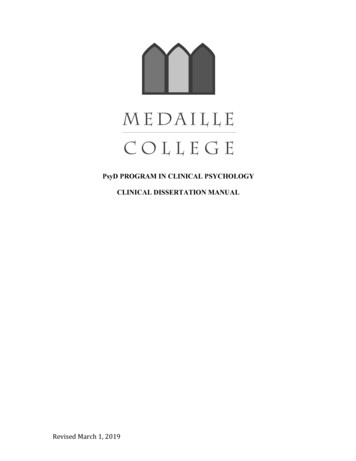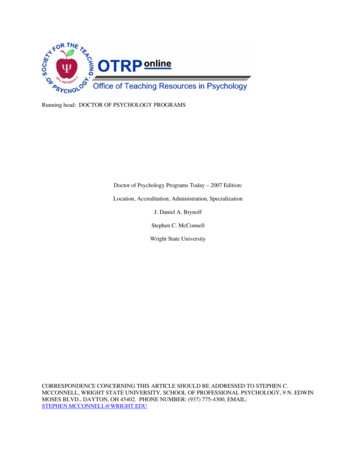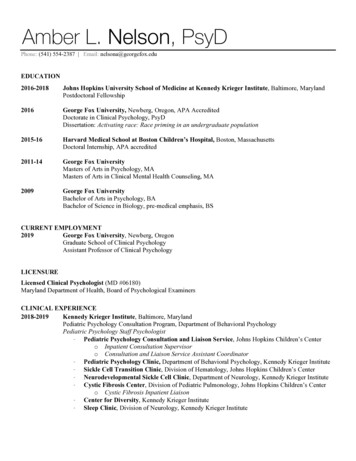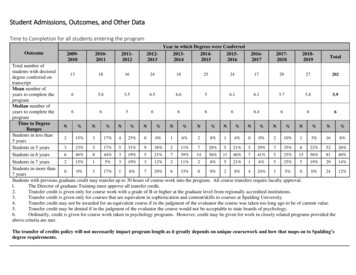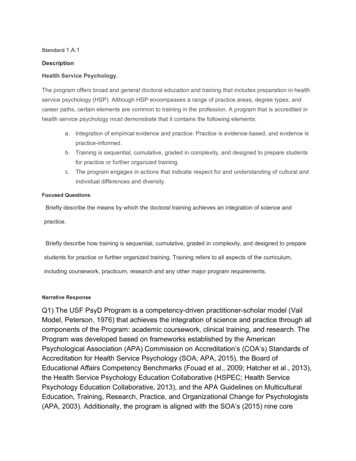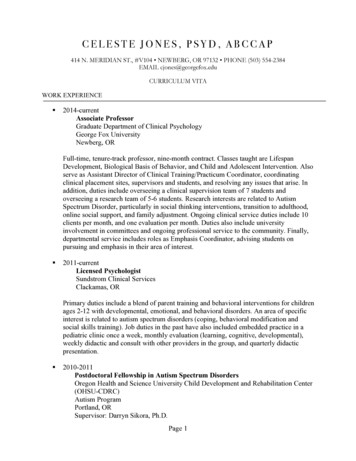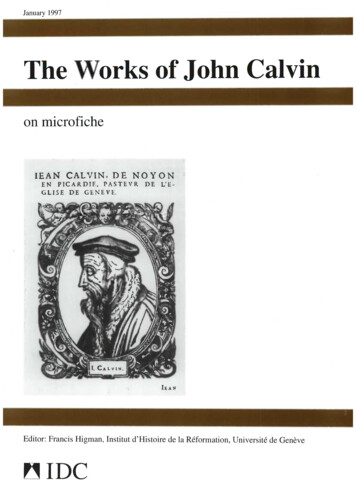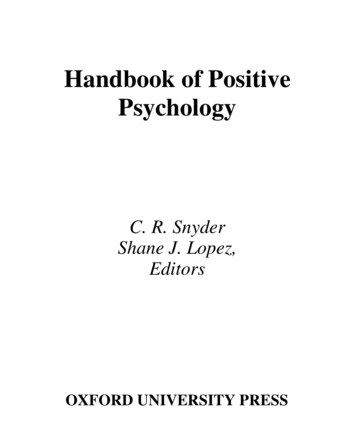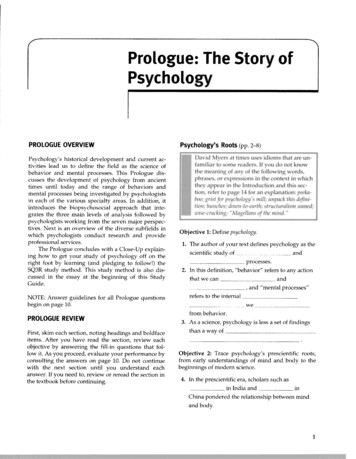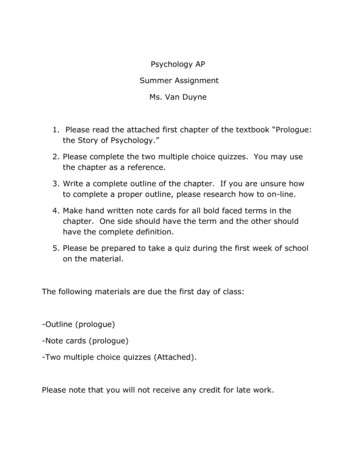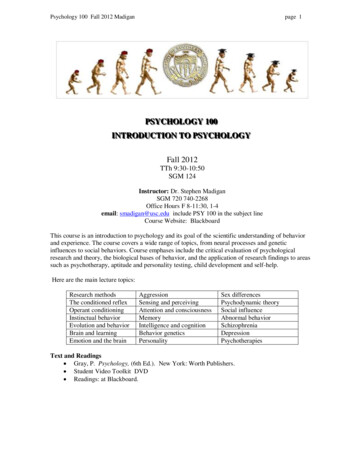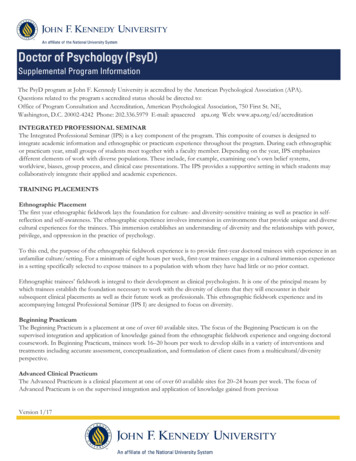
Transcription
Doctor of Psychology (PsyD)Supplemental Program InformationThe PsyD program at John F. Kennedy University is accredited by the American Psychological Association (APA).Questions related to the program's accredited status should be directed to:Office of Program Consultation and Accreditation, American Psychological Association, 750 First St. NE,Washington, D.C. 20002-4242; Phone: 202.336.5979; E-mail: apaaccred@apa.org; Web: www.apa.org/ed/accreditationINTEGRATED PROFESSIONAL SEMINARThe Integrated Professional Seminar (IPS) is a key component of the program. This composite of courses is designed tointegrate academic information and ethnographic or practicum experience throughout the program. During each ethnographicor practicum year, small groups of students meet together with a faculty member. Depending on the year, IPS emphasizesdifferent elements of work with diverse populations. These include, for example, examining one’s own belief systems,worldview, biases, group process, and clinical case presentations. The IPS provides a supportive setting in which students maycollaboratively integrate their applied and academic experiences.TRAINING PLACEMENTSEthnographic PlacementThe first year ethnographic fieldwork lays the foundation for culture- and diversity-sensitive training as well as practice in selfreflection and self-awareness. The ethnographic experience involves immersion in environments that provide unique and diversecultural experiences for the trainees. This immersion establishes an understanding of diversity and the relationships with power,privilege, and oppression in the practice of psychology.To this end, the purpose of the ethnographic fieldwork experience is to provide first-year doctoral trainees with experience in anunfamiliar culture/setting. For a minimum of eight hours per week, first-year trainees engage in a cultural immersion experiencein a setting specifically selected to expose trainees to a population with whom they have had little or no prior contact.Ethnographic trainees’ fieldwork is integral to their development as clinical psychologists. It is one of the principal means bywhich trainees establish the foundation necessary to work with the diversity of clients that they will encounter in theirsubsequent clinical placements as well as their future work as professionals. This ethnographic fieldwork experience and itsaccompanying Integral Professional Seminar (IPS I) are designed to focus on diversity.Beginning PracticumThe Beginning Practicum is a placement at one of over 60 available sites. The focus of the Beginning Practicum is on thesupervised integration and application of knowledge gained from the ethnographic fieldwork experience and ongoing doctoralcoursework. In Beginning Practicum, trainees work 16–20 hours per week to develop skills in a variety of interventions andtreatments including accurate assessment, conceptualization, and formulation of client cases from a multicultural/diversityperspective.Advanced Clinical PracticumThe Advanced Practicum is a clinical placement at one of over 60 available sites for 20–24 hours per week. The focus ofAdvanced Practicum is on the supervised integration and application of knowledge gained from previousVersion 1/17
practica, and ongoing doctoral coursework. At a more complex level than Beginning Practicum, trainees develop skills incomprehensive assessment, conceptualization, and formulation of client cases from a multicultural/diversity perspective.However, the focus in Advanced Practicum is extended to include advanced skills in the development of systematic andempirically justifiable plans for intervention with individ-uals, groups, or communities within the larger context of humandiversity and social change.PRE-DOCTORAL INTERNSHIPTrainees apply for pre-doctoral internship when they are in the fourth year of the full-time curriculum. Trainees need to beregistered for the relevant number of internship units for each quarter in which they are accruing internship hours.JFK University PsyD trainees may apply for full-time or part-time internship programs that are accredited by APA, and insome cases internships that are part of the CAPIC and APPIC consortia. To be considered full time, trainees must work aminimum of 35 hours per week. A full-time internship is completed in four quarters at nine units per quarter for a total of 36units.EXAMINATIONSComprehensive Written ExaminationThis examination, typically given in the summer of year three, is similar to the Examination for Professional Practice inPsychology (EPPP), which is one of the requirements for California licensure. The exam consists of 200 multiple-choicequestions and is taken after successful completion of required first-, second-, and third year courses. Passing this exam is arequirement for advancement in both the academic and clinical portions of the program.Clinical Proficiency ExaminationIn the spring of year four, students present a written clinical case report to two faculty members who examine the student onthe case. Passing this exam is a requirement for advancement in both the academic and clinical portions of the program.Licensure Examination PreparationAll areas of study assessed on the comprehensive exams and national licensing exam are augmented with materials fromTaylor Study Method (TSM). TSM provides students with a shadow curriculum including key terms, flashcards, mind maps,and practice exam questions.ADVISEMENTAfter matriculating into the program, students are assigned a faculty advisor with whom they meet at least once per quarter.Student performance in coursework, placements, and practica is evaluated on an ongoing basis, with formal yearly reviews.Each year must be completed satisfactorily for students to advance in the program. Failure to meet requirements foradvancement will result in a referral to the Review and Advisement Committee to clarify and remediate the difficulty. In someinstances, students may be required to supplement or repeat certain areas of the program, take a leave from the program, orbe terminated from the program.SATISFACTORY PROGRESSMeeting program expectations in all competency areas in coursework, all requirements of fieldwork/practica, and passing thewritten comprehensive examination and the clinical proficiency examination are required before students may proceed to thenext year of the program or internship. Failure to meet requirements for advancement to the next year may result in a studentbeing required to supplement or repeat certain areas of the program or in termination from the program.Version 1/17
MA DEGREE IN CLINICAL PSYCHOLOGYA student will be awarded an MA degree in Clinical Psychology when he or she has satisfactorily completed all required first-,second-, and third-year courses, is in good standing, and has passed the comprehensive written examination. This degree isnon-terminal and non-licensable. Students who come into the PsyD program with an MA in Psychology are not awarded asecond master’s degree.CLINICAL DISSERTATION PROJECTThe clinical dissertation project is an intensive study in an area of interest. Projects must reflect the program’s emphasis ondiverse or underserved populations and have clinical applicability. The dissertation integrates research findings, relevantliterature, and original thought, deriving input from the population under study and contributing to the field of appliedpsychology. Traditional quantitative methodologies may be utilized or students can explore and use other research modalities.Projects may take the form of a program evaluation, theoretical exploration, meta-analysis, case study, phenomenologicalstudy, ethnography, or grounded-theory exploration. A dissertation proposal must be successfully defended prior to rankingof pre-doctoral internship, and a successful final dissertation defense is required for the degree to be awarded.Completed dissertations can be found at the John F. Kennedy University Library and in the office of the PsyD ResearchDirector. Recently completed dissertations include:“A Subjective Inquiry of Lesbian Sexuality: A Grounded Theory Analysis”“African-American Women and Human Immunodeficiency Virus Prevention: A Qualitative Approach toAssessing Needs”“Culturally Sensitive Clinical Guidelines for Mental Health Professionals Working with Iraqi Women in theUnited States”“Disability in Context: The Application of Narrative Theory to Multidimensional Health Care Problem”“High School Teacher Intervention in Anti-Gay Harassment”“Learned Helplessness: A Pathway between Childhood Trauma and Homelessness in Women”“Risk and Protective Factors Associated with Suicide and Depression among African-American Males.”DISSERTATION EXTENSIONStudents must register for PSD 7302 dissertation (0.5 units) and pay tuition for each quarter until the dissertation is defended.PSD 7302 may be taken a maximum of three times for credit (1.5 units). The student must continue to retake PSD 7302 untilthe dissertation is successfully defended, but will not receive more than 1.5 units in total.ADVANCEMENT TO CANDIDACYIn order to advance to candidacy prior to internship, each student must have satisfactorily completed all coursework, allpractica, the Comprehensive Written Examination, the Clinical Proficiency Examination, and the clinical dissertation proposaldefense. The student may then enter into an approved internship after completing 144 academic units.INDIVIDUAL PSYCHOTHERAPYAll students in the PsyD program are required to complete at least 50 hours of individual psychotherapy within an 18-monthtime period after matriculation into the PsyD program and prior to beginning internship. Psychotherapy must be with alicensed therapist. Students do not receive academic credit for psychotherapy.Version 1/17
DOCTOR OF PSYCHOLOGY (PsyD) CURRICULUMPREREQUISITESThese courses or their approved equivalents are prerequisites to the PsyD program. All prerequisite courses must becompleted prior to attending first-year PsyD courses, with official transcripts documenting successful completion on file inthe registrar’s office. Prerequisite courses completed after the awarding of the bachelor’s degree must have a grade of B- orbetter. Prerequisite courses may be taken from an institution that is regionally accredited or has other recognizedaccreditation.Introduction to PsychologyDiversity-related CourseStatisticsTheories of PersonalityThe following is the full-time curriculum with four years of academic work. All courses are 3 quarter units unless otherwiseindicated.COURSESYear 1PSD 7007PSD 7008PSD 7015PSD 7016PSD 7035PSD 7046PSD 7047PSD 7104PSD 7122PSD 7123PSD 7141Clinical Interviewing Skills IClinical Interviewing Skills IIAdult Psychopathology IAdult Psychopathology II1 Ethnographic Placement1 (6 total)Group Process 1 (3 total)Multicultural Awareness in Professional Psychology1 (6 total)Social and Cultural Bases of BehaviorPsychodynamic Theory and Its Application to Diverse PopulationsCognitive Behavioral Theory and Its Application to Diverse PopulationsEthical and Legal Issues in Professional PsychologyYear 2PSD 7135PSD 7146PSD 7147PSD 7003PSD 7151PSD 7250PSD 7225PSD 7226PSD 7107PSD 7108PSD 7124PSD 7114Beginning Practicum1 (6 total)Advanced Group Process1 (3 total)Multicultural Proficiency in Professional Psychology1 (3 total)History and Systems of Professional PsychologyResearch Methods and Statistics IResearch Methods and Statistics IILifespan Development I: Child and AdolescentLifespan Development II: Adulthood and AgingBiological Bases of BehaviorCognitive and Affective Bases of BehaviorFamily Systems Theory and Its Application to Diverse PopulationsPsychometrics: The Basics of AssessmentVersion 1/17
Year 3PSD 7131 Psychology of AddictionPSD 7115 Assessment I/Intellectual/Cognitive Assessment and Lab (4)PSD 7116 Assessment II/Personality Assessment I and Lab (4)PSD 7117 Assessment III/Personality Assessment II and Lab (4)PSD 7118 Assessment Practicum (0 - 3)PSD 7160 PsychopharmacologyPSD 7251 Qualitative Research: Critical ReviewPSD 7252 Clinical Dissertation Proposal I (2)PSD 7253 Clinical Dissertation Proposal II (2)PSD 7254 Clinical Dissertation Proposal III (1)Comprehensive Written Examination2 (0)Year 4PSD 7025 Child and Adolescent Issues: Psychopathology and TreatmentPSD 7215 Consultation in Professional PsychologyPSD 7230 Fundamentals of Clinical SupervisionPSD 7235 Practicum III1 (9 total)PSD 7245 Contemporary Issues in Professional Psychology1 (3 total)PSD 7302 Dissertation Completion1 (1.5 - 2)Electives (Accrued across all years, typically starting in Year 2) (17)Clinical Proficiency Examination (0)Advancement to Candidacy (0)Total academic units144Year 5PSD 7400 Internship (36)Dissertation Defense (0)Total units required1801 This is a repeatable course and must be taken multiple times to total the number of units indicated.2 Students in good standing who have passed the comprehensive written examination will be awarded an MA degree in ClinicalPsychology after satisfactorily completing specified first- and, second-, and third-year courses. This degree is non-terminal and nonlicensable. Students who have been awarded a MA degree in psychology will not receive a non-terminal degree from JFK University.3 The maximum number of credits that apply to the degree is 1.5, but students are required continue to enroll in this course and paytuition until the dissertation is successfully defended.Version 1/17
JFK University PsyD trainees may apply for full-time or part-time internship programs that are accredited by APA, and in some cases internships that are part of the CAPIC and APPIC consortia. To be considered full time, trainees must work a minimum of 35 hours per week. A full-time inter
